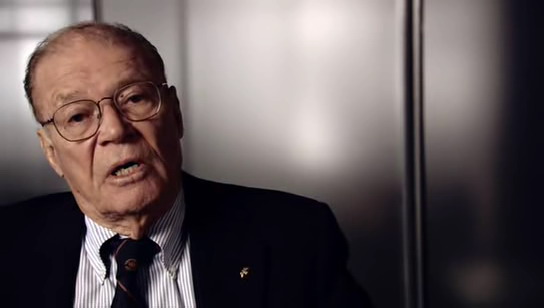The Dems held one more for the road last night in New Hampshire and, given that a rather bland Kerry didn’t stumble, it’s starting to look dire for Dean, who was subdued and chagrined most of the evening and only now seems to be turning the corner on his Muskie Moment. Edwards did reasonably well despite invoking states’ rights (which never sounds good with a southern accent) to support his convoluted gay marriage position. And I actually liked Clark better than usual, and thought he handled his recent party switch as well as he could.
But, I have to say, I was extraordinarily irritated by the way the whole Dubya Deserter thing played out last night. First Peter Jennings tells Wesley Clark that Michael Moore’s deserter comment was “a reckless charge not supported by the facts” and asks him if it’d have been “a better example of ethical behavior” to contradict him. Clark doesn’t go either way on it, claiming not to know all the facts. (Which is lame — What’s the point of having a General in the running if he’s not going to call out Bush on exactly this question?) Then, once the show’s over, Fox News pulls out Team Bespectacled White Guys (Mort Kondracke and Fred Barnes), who both immediately argue that Clark irreparably damaged his candidacy by not refuting this baseless charge, yadda yadda yadda.
Um, am I missing something? It’s been substantiated quite well that Bush seems to have gone AWOL by the Boston Globe and others, and I’m not talking about the six or seven critical hours on September 11 when he was toodling around above the Heartland. While absence of evidence isn’t necessarily evidence of absence, Dubya seems to have disappeared from the Air National Guard for almost a year between 1972-73, conveniently right before a drug test (an offense for which he was grounded), and, to this day, he has never satisfactorily explained where he was. (In fact, as the Straight Dope notes, later reports in The New Republic (by Ryan Lizza, if I remember correctly) even cast doubt on the half-hearted “some recollection” explanation Dubya gave during the 2000 campaign. (By the way, this all happened several years after Bush scored in the underwhelming 25th percentile on the pilot’s aptitude portion of the entrance exam, thus having to rely on his congressman-daddy’s connections to jump the year-long waiting list for the Air National Guard in the first place.)
Does all of this prove beyond the shadow of a doubt that Dubya pulled a Cold Mountain? Well, no, but it’s definitely enough to suggest that Bush has some serious explaining to do. (And he revoked any “youthful indiscretion” type-defense when he began parading around in flight gear on the USS Lincoln.) So, I mean, c’mon, now, a baseless charge about Bush? At this point it seems more correct to say that the bases were “Bush-less.” Next thing you’ll know Fox News will be screaming at John Kerry for perpetuating the “vicious rumor” of Dubya’s DUI.
At any rate, regarding other matters, I didn’t see Diane Sawyer or Letterman last night so can’t ascertain how Dean damage control went there, but I did catch the Dallas-Laker game on TNT, and during Inside the NBA EJ, Kenny and Charles must have played the Dean Scream about thirty times…in fact Ernie had it connected to his desk button. “Nash kicks to Dirk, Dirk from the corner…YEEEEEAAAAGH! Sacramento’s up big in the third…YEEEEEAAAGH!” And so on, so on. Pretty much the first political content I’ve ever seen on the show, and, yeah, it was funny every time. Poor Dean.


